Search Results
Showing results 201 to 220 of 242

Sand Study
Source Institutions
In this geology activity, learners use a microscope to discover and identify the components of sand.
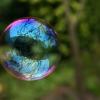
Capturing Carbon Dioxide
Source Institutions
In this activity, learners investigate carbon sequestration by creating a carbonated beverage out of apple juice and dry ice.
Build A Hydrometer
Source Institutions
In this activity, learners will explore how a hydrometer works by building a working model and conducting experiments.
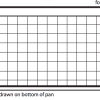
Dispersing Dispersion
Source Institutions
In this activity, learners investigate the movement caused by dispersion. Learners discover that dispersion is the random movement of objects.
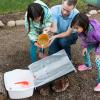
Runaway Runoff
Source Institutions
When it rains, water can collect on top of and seep into the ground. Water can also run downhill, carrying soil and pollution with it.

Super Soaking Materials
Source Institutions
In this activity, learners will test cups full of potting soil, sand, and sphagnum moss to see which earth material is able to soak up the most water.

Size it Up
Source Institutions
Learners investigate why the Sun and Moon appear the same size in the sky even though the Sun is over 400 times larger in diameter.

Hot Stuff!: Investigation #3
Learners test two jars of ice water, one covered and one open, for changes in temperature. After placing the jars in the sun, learners discover that the covered jar cools down more slowly.

Challenge: Microgravity
Source Institutions
In this activity about the circulatory system and space travel (on page 38 of the PDF), learners use water balloons to simulate the effects of gravity and microgravity on fluid distribution in the bod
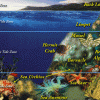
The Wave
Source Institutions
In this multi-step experiment (page 4 of pdf), learners study tide pools, and then drop a "wave" (a 4-pound bag of beans or birdseed) on a shell to mimic the force of crashing surf on tide pool animal

Water Cycle in a Bag
Source Institutions
In this activity, learners create a biosphere in a baggie.
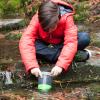
Window Under Water
Source Institutions
Glare from the sun and ripples from the wind can make it hard to see what's below the surface of a body of water.
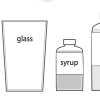
Density Stackers
Source Institutions
In this activity, learners investigate density as they discover how liquids separate to form density layers. Learners discover what happens when they add syrup, cooking oil, and water to a jar.
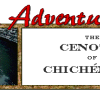
Solving Dissolving
Source Institutions
The Sacred Cenote at Chichén Itzá is a sink hole, or well, containing groundwater. In this activity, learners create their own cenote using chalk, limestone, acids, and rain water.

Super Soaker
Source Institutions
In this activity (page 1 of the PDF under SciGirls Activity: Bogs), learners will test cups full of potting soil, sand, and sphagnum moss to see which earth material is able to soak up the most water.
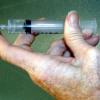
"Boyle-ing" Water
Source Institutions
In this activity, learners explore Boyle's Law and discover that water will boil at room temperature if its pressure is lowered.
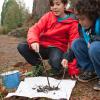
Dip Dip, Hooray
Source Institutions
Lakes, streams and other freshwater bodies are a habitat for lots of living things, big and small.
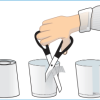
Cleaning Water with Dirt
Source Institutions
In this activity on page 7 of the PDF (Water in Our World), learners make their own water treatment systems for cleaning water.

Fill 'er Up!
Source Institutions
Learners discover that their breath contains carbon dioxide, one of the pollutants found in car exhaust.
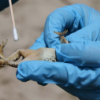
Monitoring Amphibians
Source Institutions
In this field study, learners discover how to collect data in the field and how their efforts can help certain animals, specifically, amphibians.
